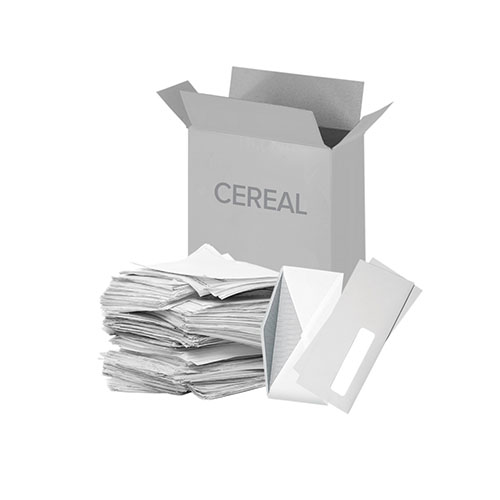
Paper and Boxes
Residents can recycle mixed paper, newspapers, magazines, junk mail in curbside recycling program or mixed paper drop off. Businesses can contract for service.
Paper is the most recycled material in the U.S. You can recycle many types of mixed paper, boxboard, and cardboard in your curbside recycling.
When recycling mixed paper and boxes, items should be empty, clean, dry, and out of the rain or weather. Flatten cardboard. Place mixed paper loose in a curbside recycling cart or bin. If you must use bags to hold your recycling, empty the bag loose into your cart or bin. Discard plastic bags in the trash.
YES, INCLUDE THESE ITEMS IN RECYCLING
- Newspapers and inserts
- Magazines and catalogs
- Junk mail and envelopes (window envelopes are okay), coupon packets
- Postcards and plain, undecorated greeting cards
- Paper grocery and shopping bags
- Cereal and dry food boxes, shoe boxes, toothpaste, or OTC medicine boxes
- Paper tubes and tissue boxes from paper products
- Office paper, stationery, business cards, any color
- Hard (cover removed) or soft cover books, phone books
- Wrapping paper (including the cardboard tube)
- Cardboard (flattened)
- Clean pizza boxes (no food or excess grease)
- Paper egg cartons
- Frozen food boxes (on the accepted list as of March 2022)
DO NOT INCLUDE
- No wet or soiled paper and boxes. Avoid getting paper and cardboard wet, as it significantly reduces its recyclability. Empty all cans, plastic bottles and jugs, and glass bottles and jars, and replace the cap (if available) before tossing them in your cart or bin so they don't drain on your paper.
- No napkins, tissues, or paper towels. Do not include items used for bodily fluids or food.
- No tissue wrapping or crepe paper. This type of paper is too light to be sorted properly at the mixed recycling MRF. Undecorated tissue wrapping paper can be recycled at designated mixed paper recycling drop-off bins.
- No register receipts and printed lottery tickets. Because of the plastic coating, receipts cannot be recycled. Thermal receipts do not pulp like other paper and should go in the trash.
- No food or candy wrappers. Wrappers are typically made of multiple materials. Bits of plastic, aluminum, and paper are mixed, making it difficult and expensive to recover.
- No bundled paper. Items should be loose, not tied with string or twine, or nested together. Loose materials are sorted properly at the MRF. String and twine is a tangler.
- No photographs. Can not be recycled due to chemical coatings used in the photo-developing process.
- No shredded paper. Shredded paper is too small to make it through the sorting system at the recycling plant. It's best to take shredded paper to a mixed paper drop-off bin. Use a bag to contain your shredded paper.
- No foil, ribbon, glitter, rope, fabric, or other decorations. Decor on cards, gift bags, or wrapping paper contaminates the recycling process.
Mixed Paper Drop-Offs
Mixed paper and cardboard can be dropped off at a paper recycling bin, typically found in school or municipal parking lots, nonprofits, places of worship, and the Cleveland Metroparks. A list of Metroparks locations is on our Cardboard page. Royal Oak Recycling (Paper Retriever) and Integrity Fiber (fka. River Valley Paper Company) do not provide a regularly updated list of their locations to the Solid Waste District. Check with your city service department for a list of paper bins in your community,
The Solid Waste District hosts a Royal Oak Recycling paper bin. The mixed paper recycling bin in our parking lot at 4750 East 131 Street in Garfield Heights, accepts mixed paper, shredded paper, junk mail, magazines, office paper, phone books, boxboard, and corrugated cardboard. Be a good recycler. Rain and precipitation in the District's mixed paper bin make the paper wet and can ruin recycling efforts. We appreciate recyclers who close the lid after they've placed clean, dry paper or flattened cardboard inside it.
Why should I keep cardboard and paper dry?
When paper gets wet, it lowers the quality of the paper and its usefulness for recycling. Each time paper gets wet and dries out, the fibers become shorter, making the paper brittle, crumbly, and less valuable to recyclers. Wet paper also tends to mold quickly, which lowers its value as a recyclable commodity.
Additionally, wet paper is difficult to sort at the materials recovery facility (MRF) where curbside recyclables are sorted and baled. The machines that sort paper are designed to handle dry, lightweight materials. Heavy, wet paper may jam equipment and not get properly sorted causing it to be thrown away. If it can't be contained in an enclosed cart, it's recommended that residents only put paper and flattened cardboard out on a dry day.
The Solid Waste District's phone book recycling program in the Cleveland Metroparks was eliminated in 2013.
Businesses with large quantities of mixed paper can contact local paper recycling companies for service information. See below for a list of Business Locations.
---
Looking to recycle, donate, or dispose of other items? Use the dark blue 'What Do I Do With?' search bar at the top of every page of this website. Allow location services or use the city drop-down to find opportunities in your local area.
